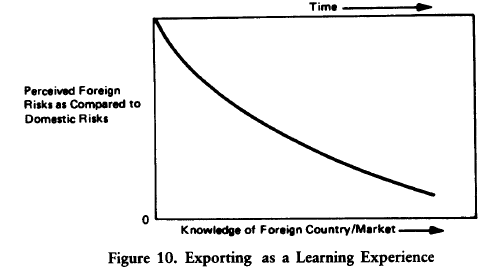To go international for the first time, a company must overcome anxieties about its ability to compete in foreign markets. The neophyte international firm, therefore, is more concerned with minimizing international market and political risks than with maximizing control over international marketing operations. Given this situation, exporting will usually appear to the manufacturer as the best entry mode.
By using indirect channels, a firm can start exporting with no incremental investment in fixed capital, low startup costs, few risks, and profits on current sales. Furthermore, the firm can gradually increase its export effort by building on prior success in foreign markets: adding products to the export line, entering new target markets, and shifting to direct exporting. Thus, exporting enables a firm to adopt an exploratory, experimental behavior to obtain knowledge about foreign markets and its ability to compete in them. In other words, exporting can become an international learning experience, a development process that takes the firm toward more and more international sophistication and commitment.1
Figure 10 depicts the effect of this learning experience on risk perception. At the start, the company has no experiential knowledge of foreign countries and markets, and this felt ignorance generates uncertainties that cause managers to perceive foreign business risks as far higher than domestic business risks. But as the company gains knowledge and confidence from actual export experience, perceived foreign risks decline to approach the level of perceived domestic risks. At the same time, rational decision making displaces or limits the behavioral factors (fears, anxieties, ethnocentric biases, and so on) that dominated earlier decision making. Managers now consider direct export modes that allow greater control over the foreign marketing effort. Risk is balanced against opportunity. Thus the firm moves along the path of entry mode dynamics as described in Chapter l.

Licensing and equity investment in foreign production do not offer the advantages of exporting as a first learning experience. Although licensing is also easy to initiate with low startup costs, it is available only to manufacturers that have technology or trademarks desired by foreign firms. Moreover, the return on licensing is ordinarily limited in both size and duration. Apart from these constraints, licensing simply does not afford managers .a., learning experience comparable to exporting, because the marketing of licensed products is controlled by the foreign licensees. Nonetheless, in some instances licensing can be the most attractive entry mode for a neophyte firm. Licensing can also provide an export entry for intermediate products, and a licensing arrangement later may be transformed into a joint or even sole manufacturing venture.
Equity investment in foreign production is seldom used by manufacturers new to international business. Direct investment should be made only after a company has an intimate understanding of the investment climate, the market, competition, and production in the target country. This formidable knowledge requirement can seldom be met by a neophyte interna
tional company. Furthermore, equity investment often demands a substantial capital investment and, at the same time, exposes the investor to political risks that are largely absent in exporting. Although a joint venture can facilitate an early entry into equity foreign production, it too requires knowledge and skills unlikely to be possessed by a company without prior international experience. In short, for a manufacturing firm to start its international learning experience with equity foreign production is akin to a person learning to swim by jumping into deep water: learning would be intense, but the cost of failure would be very high.
Source: Root Franklin R. (1998), Entry Strategies for International Markets, Jossey-Bass; 2nd edition.

I don’t even know how I ended up here, but I thought this post was great. I do not know who you are but definitely you are going to a famous blogger if you are not already 😉 Cheers!
I’m very happy to read this. This is the type of manual that needs to be given and not the random misinformation that is at the other blogs. Appreciate your sharing this best doc.